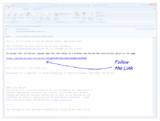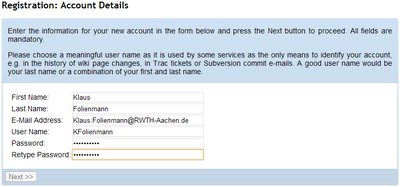
Simple start
From sselab
| Line 6: | Line 6: | ||
## You got an email: click the link in that email. | ## You got an email: click the link in that email. | ||
## Enter some personal data, it is really helpful to use your surename as login (or another name that identifies you to the other team members). | ## Enter some personal data, it is really helpful to use your surename as login (or another name that identifies you to the other team members). | ||
| + | |||
[[File:registration.png|center|thumb|400px|SSELab Registration Form]] | [[File:registration.png|center|thumb|400px|SSELab Registration Form]] | ||
| + | |||
# You now have the account and are member of the project. | # You now have the account and are member of the project. | ||
#* This allows you to login to sselab and browse the project data. | #* This allows you to login to sselab and browse the project data. | ||
Revision as of 13:38, 9 March 2012
You have been invited to the sselab and you have no idea what this means? You probably shall share some documents within a team and come to an integrated final document easily (--> version control) or shall collect thoughts, ideas, problems etc. (--> wiki). Simple storage like Dropbox is also available. Let's forget about all the other services for now and lets handle this:
- You need to make an account.
- Having an account simplifies access when using multiple projects. All services and projects can be managed with one account (and password).
- You got an email: click the link in that email.
- Enter some personal data, it is really helpful to use your surename as login (or another name that identifies you to the other team members).
- You now have the account and are member of the project.
- This allows you to login to sselab and browse the project data.
What's next?
You can
- Browse the projects services
- Checkout svn (if it is a selected service)
- Look at the internal and external wikis (if selected services)
- Note that the external wiki is globally visible, while only you can write
- Install the webdav (if selected service)
- Look at the mailinglist
- BTW: When the project is called "example", the according maillinglist where you can reach all other members is "example@lab9.sselab.de"
Subversion
Subversion is a relatively mighty and therefore also complex technique to concurrently work on files. When people really work on share files concurrently, it's important to have versioning available: subversion does this! And to manage conflicts in concurrent changes: subversion does this too! (When a conflict arises or you want an older version you need a deeper understanding or have to ask. E..g. have a look here. For simple cases:
- You need to install a local subversion client. You may choose. XXX is quite good, but Eclipse plugin also helps.
- Please install your svn-client
- Checkout the files using the name and password of your sselab-account.
- Then you are ready to operate.
As an alternative for read only access:
- browse the project,
- click on "Subversion"
- (optional, first time only): enter your access data and password
- and you have webaccess to the current(!) revision (!no changes!).
Wikis
Its simple:
- browse the project,
- click on "MediaWiki (internal)"
- (optional, first time only): enter your access data and password
- and you are looking at the wiki. Its a mediawiki -- same syntax, same features.
This is just an abstrct overview -- see [http:/XXX here for more]:
- To edit full page: click "Edit" on the left side
- To edit a section: click "[edit]" on the right side
- When the page is important and you want to be informed by email of any change: click "Watch"
- Some syntax:
- XXX


